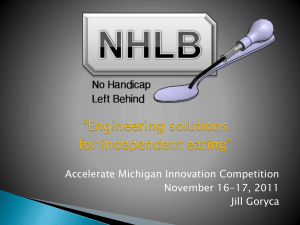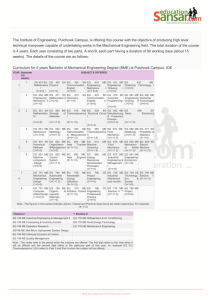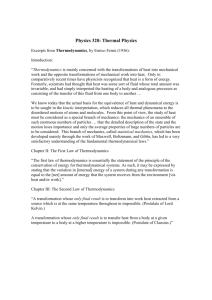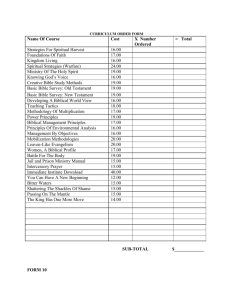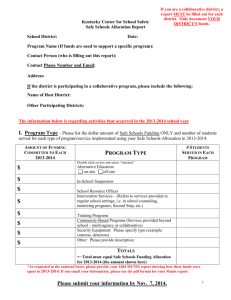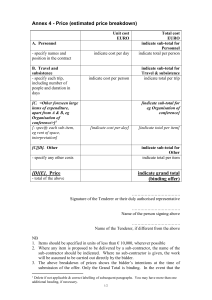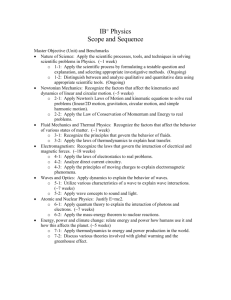Mechanical Engineering - Philippine Association of Engineering
advertisement
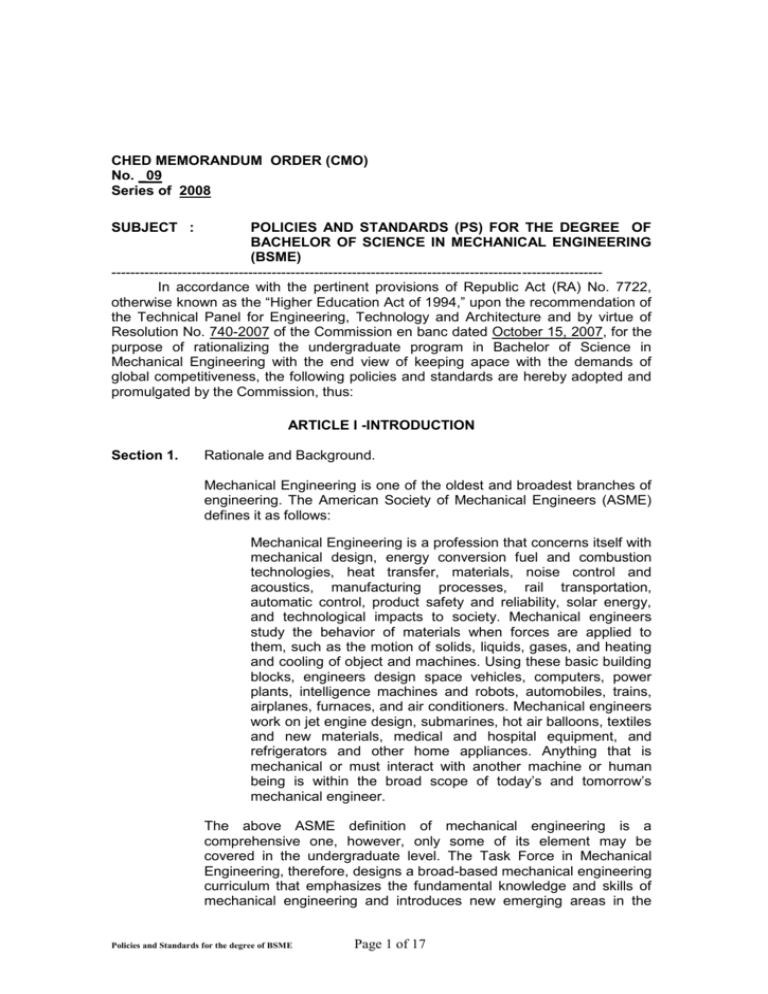
CHED MEMORANDUM ORDER (CMO) No. _09 Series of 2008 SUBJECT : POLICIES AND STANDARDS (PS) FOR THE DEGREE OF BACHELOR OF SCIENCE IN MECHANICAL ENGINEERING (BSME) -------------------------------------------------------------------------------------------------------In accordance with the pertinent provisions of Republic Act (RA) No. 7722, otherwise known as the “Higher Education Act of 1994,” upon the recommendation of the Technical Panel for Engineering, Technology and Architecture and by virtue of Resolution No. 740-2007 of the Commission en banc dated October 15, 2007, for the purpose of rationalizing the undergraduate program in Bachelor of Science in Mechanical Engineering with the end view of keeping apace with the demands of global competitiveness, the following policies and standards are hereby adopted and promulgated by the Commission, thus: ARTICLE I -INTRODUCTION Section 1. Rationale and Background. Mechanical Engineering is one of the oldest and broadest branches of engineering. The American Society of Mechanical Engineers (ASME) defines it as follows: Mechanical Engineering is a profession that concerns itself with mechanical design, energy conversion fuel and combustion technologies, heat transfer, materials, noise control and acoustics, manufacturing processes, rail transportation, automatic control, product safety and reliability, solar energy, and technological impacts to society. Mechanical engineers study the behavior of materials when forces are applied to them, such as the motion of solids, liquids, gases, and heating and cooling of object and machines. Using these basic building blocks, engineers design space vehicles, computers, power plants, intelligence machines and robots, automobiles, trains, airplanes, furnaces, and air conditioners. Mechanical engineers work on jet engine design, submarines, hot air balloons, textiles and new materials, medical and hospital equipment, and refrigerators and other home appliances. Anything that is mechanical or must interact with another machine or human being is within the broad scope of today’s and tomorrow’s mechanical engineer. The above ASME definition of mechanical engineering is a comprehensive one, however, only some of its element may be covered in the undergraduate level. The Task Force in Mechanical Engineering, therefore, designs a broad-based mechanical engineering curriculum that emphasizes the fundamental knowledge and skills of mechanical engineering and introduces new emerging areas in the Policies and Standards for the degree of BSME Page 1 of 17 discipline. To meet this purpose, the curricular requirements for elective courses are increased to twelve units. These elective courses may be utilized to introduce new courses in mechanical engineering as suggested by these curricular guidelines or to design a concentration or tracking in the mechanical engineering program such as manufacturing engineering, mechatronics engineering, automotive engineering, biomedical engineering, HVAC/R engineering ( heating, ventilating, air – conditioning and refrigerating ), etc. The Task Force strongly suggests that in the selection of new elective courses or in the design of a concentration or tracking, the school considers the thrust of industrial development in their locality or region. Furthermore, the new mechanical engineering curriculum includes a senior design or thesis project that addresses the specific needs of the communities where the schools are located. The herein Policies and Standards (PS) have been reviewed in accordance with recently approved CMOs, industry needs, latest trends and technology in the field of mechanical engineering. This PS emerged as a result of consolidated efforts of the academe, industry and other concerned agencies. ARTICLE II - AUTHORITY TO OPERATE Section 2. All private higher education institutions (PHEIs) intending to offer Bachelor Of Science in Mechanical Engineering must first secure proper authority from the Commission in accordance with existing rules and regulations. State Universities and Colleges (SUCs), and Local Colleges and Universities (LCUs) should likewise strictly adhere to the provisions of these policies and standards. ARTICLE III -PROGRAM SPECIFICATION Section 3. Degree Name The degree program herein shall be called BACHELOR OF SCIENCE IN MECHANICAL ENGINEERING (BSME). Section 4. Program Description 4.1 Objectives To provide quality Mechanical Engineering education for global competitiveness 4.2 Program Outcomes A graduate of the Bachelor of Science in Mechanical Engineering (BSME) program must have attained: a. An ability to apply knowledge of mathematics, science and engineering Policies and Standards for the degree of BSME Page 2 of 17 b. c. d. e. f. g. h. i. An ability to design and conduct experiments, as well as to analyze and interpret data An ability to design a system, component or process to meet desired needs within realistic constraints An ability to function on multi-disciplinary teams An ability to identify, formulate and solve engineering problems An understanding of professional and ethical responsibility An ability to communicate effectively in both Filipino and English languages An understanding of the impact of engineering solutions in a global and societal context An ability to use techniques, skills and modern engineering tools necessary for mechanical engineering practice 4.3 Specific Professions/ Careers/ Occupations or trades that the graduates may go into 4.3.1 Fields of Specialization 1. 2. 3. 4. 5. Power and Energy Engineering Automotive Engineering Manufacturing Engineering Mechatronics and Robotics Heating, Ventilating, Air-conditioning and Refrigeration (HVAC & R) 6. Biomedical Engineering 7. Instrumentation and Controls 4.3.2 Career Options 1. 2. 3. 4. 5. 3. 4. 8. 9. Operations Maintenance Design and Consultancy Production Education Entrepreneurship Management and Supervision Sales and Marketing Research and Development Section 5. Allied Programs : For purposes of determining the faculty qualifications, the following are the BSME allied programs: 1. 2. 3. 4. 5. 6. Policies and Standards for the degree of BSME Electrical Engineering Manufacturing Engineering Aeronautical/Aerospace Engineering Environmental Engineering Biomedical Engineering Mechatronics and Robotics Engineering Page 3 of 17 ARTICLE IV - COMPETENCY STANDARDS Section 6. This section defines the entry-level competency standards, knowledge, attitudes, values and skills applicable to the BS Mechanical Engineering graduate, which are contained in ANNEX I of this Memorandum. ARTICLE V - CURRICULUM Section 7. Curriculum Description 7.1 7.2 7.3 7.4 Section 8. The BS Mechanical Engineering curriculum has a total of 211 credit units. The program comprised of the general education, technical, allied, fundamental, professional, technical elective courses and plant visit or on-the-job-training. The general education courses are in accordance with the requirements of the CHED Memorandum Order No. 59, s. 1996The New General Education Curriculum B (GEC -B) The technical courses comprised of the 26 units of Mathematics, 12 units of Physical/Natural Sciences, 21 units of Basic Engineering Sciences, 10 units of allied courses, 54 units of fundamental courses, 23 units of professional courses and 12 units of technical elective courses. The non-technical courses comprised of 39 units of languages, humanities, social sciences and 14 units of PE/NSTP. Curriculum Outline Minimum Hours/week Classification/ Field / Course Lecture Laboratory Minimum Credit Units I. TECHNICAL COURSES A. Mathematics College Algebra Advanced Algebra 3 2 0 0 3 2 Plane and Spherical Trigonometry 3 0 3 Analytic Geometry 2 0 2 Solid Mensuration 2 0 2 Differential Calculus 4 0 4 Integral Calculus 4 0 4 Differential Equations 3 0 3 Probability and Statistics 3 0 3 Sub-Total 26 0 26 Policies and Standards for the degree of BSME Page 4 of 17 Minimum Hours/week Classification/ Field / Course Lecture Laboratory Minimum Credit Units B. Natural/Physical Sciences General Chemistry 3 3 4 Physics 1 3 3 4 Physics 2 3 3 4 9 9 12 Engineering Drawing 0 3 1 Computer Fundamentals and Programming 0 6 2 Computer –Aided Drafting 0 3 1 Statics of Rigid Bodies 3 0 3 Dynamics of Rigid Bodies 2 0 2 Mechanics of Deformable Bodies 3 0 3 Engineering Economy 3 0 3 Engineering Management 3 0 3 Environmental Engineering 2 0 2 Safety Management 1 0 1 17 12 21 2 3 3 Basic Electronics 2 3 3 DC and AC Machinery 3 3 4 Sub-Total: 7 9 10 E. Fundamental Mechanical Engineering Courses Orientation to ME 1 0 1 3 0 3 Sub-Total: C. Basic Engineering Sciences Sub-Total: D. Allied Courses Basic Electrical Engineering Advanced Engineering Mathematics for ME Policies and Standards for the degree of BSME Page 5 of 17 Minimum Hours/week Classification/ Field / Course Lecture Laboratory Minimum Credit Units Methods of Research for ME 1 0 1 Fluid Mechanics 3 0 3 Machine Elements 1 2 3 3 Machine Elements 2 2 3 3 Materials Engineering 3 3 4 Thermodynamics 1 3 0 3 Thermodynamics 2 3 0 3 Combustion Engineering 2 0 2 Heat Transfer 2 0 2 ME Laboratory 1 0 6 2 ME Laboratory 2 0 6 2 Industrial Processes 2 0 2 Safety Engineering for ME 2 0 2 Workshop Theory and Practice 0 6 2 Machine shop Theory 0 6 2 Instrumentation and Control Engineering 2 3 3 Fluid Machinery 3 0 3 Refrigeration Systems 3 0 3 Airconditioning and Ventilation Systems 2 3 3 Vibration Engineering 2 0 2 41 39 54 Machine Design 1 3 0 3 Machine Design 2 3 0 3 ME Laboratory 3 0 6 2 Industrial Plant Engineering 3 0 3 Power Plant Engineering 4 3 5 Sub-Total: F. Professional Mechanical Engineering Courses Policies and Standards for the degree of BSME Page 6 of 17 Minimum Hours/week Classification/ Field / Course Lecture Laboratory Minimum Credit Units ME Laws, Ethics, Codes and Standards 3 0 3 Plant Visit/OJT 0 6 2 ME Project Study 1 0 3 1 ME Project Study 2 0 3 1 16 21 23 12 0 12 12 0 12 Social Science 1 3 0 3 Social Science 2 3 0 3 Social Science 3 3 0 3 Social Science 4 3 0 3 12 0 12 Humanities 1 3 0 3 Humanities 2 3 0 3 Humanities 3 3 0 3 9 0 9 English 1 3 0 3 English 2 3 0 3 English 3 (Technical Communication) 3 0 3 Pilipino 1 3 0 3 Pilipino 2 3 0 3 15 0 15 Sub-Total: G. Electives Courses ME Electives Sub-Total: II. NON-TECHNICAL COURSES A. Social Sciences Sub-Total: B. Humanities Sub-Total: C. Languages Sub-Total: Policies and Standards for the degree of BSME Page 7 of 17 Minimum Hours/week Classification/ Field / Course D. Lecture Mandated Course Life and Works of Rizal Sub-Total: E. Laboratory Minimum Credit Units 3 0 3 3 0 3 Physical Education P.E. 1, 2,3,4 (2 units each) 8 Sub-Total: F. 8 National Training Service Program NSTP 1 3 NSTP 2 3 Sub-Total: 6 GRAND TOTAL 167 90 211 Suggested Elective Courses: A. Mechatronics Engineering 1. Mechatronics 2. Introduction to Robotics 3. Industrial Robot 4. Control Systems Engineering 5. Digital Control 6.Industrial Automation & Control B. Automotive Engineering 1. Automotive Engineering 2. Automotive Control 3. Crankshaft and Dampers Design 4. Fundamental of Engine Block Design. 5. Power Train Noise Vibration and Harshness 6. Inherent Engine Unbalance 7. Safety of Motor Vehicles 8. Engine Crankcase Ventilation 9. Engine Emissions and Control 10. Engine Fuel Control Systems 11. Catalytic Converters 12. Intake Manifold and Induction System Design 13.Engine Friction and Lubrication 14. Combustion Technology 15. Tribology 16. Aerodynamics C. Energy Engineering and Management 1. Alternative Energy Resource 2. Nuclear Energy 3. Solar Energy and Wind Energy Utilization 4. Energy Management in Buildings Policies and Standards for the degree of BSME 5. Energy Management Industry 6. Micro-hydro-electric Power Plant Design 7. Management of Technology Page 8 of 17 D. Computers and Computational Science 1. Computer Aided Design and Manufacturing 2. Finite Element Method 3. Computational Fluid Mechanics E. Manufacturing Engineering 1. Tool and Die Design. 2. Jigs and Fixture Design 3. Manufacturing Processes and System 4. Materials Failure in Mechanical Applications 5. Introduction to Precision Engineering 6. Materials Characterization F. Heating, Ventilating, Air-Conditioning and Refrigeration 1. Conduction Heat Transfer 2. Convection Heat Transfer 3. Radiation Heat Transfer. 4. Advanced Refrigeration and Air-Conditioning 5. Design of Thermal System 6.Indoor Air Quality in Buildings 7.Ventilation and Air-Conditioning 8. Design of Building Piping Systems 9. Noise and Vibration in Mechanical Services G. Biomechanics 1.Biomechanics of Human Movement and Control 2.Orthopedics and Injury Mechanics SUMMARY OF THE BSME CURRICULUM Total No. of Hours Total No. of Units Lecture Laboratory Classification/ Field I. TECHNICAL COURSES A. Mathematics 26 0 26 B. Natural/Physical Sciences 9 9 12 C. Basic Engineering Sciences 17 12 21 D. Allied Courses 7 9 10 E. Fundamental Courses 41 39 54 E. Professional Courses 16 12 21 0 23 12 128 90 158 12 0 12 F. Technical Electives TOTAL (TECHNICAL) II. NON-TECHNICAL COURSES A. Social Sciences Policies and Standards for the degree of BSME Page 9 of 17 Total No. of Hours Total No. of Units Lecture Laboratory 9 0 9 Classification/ Field B. Humanities C. Languages 15 0 15 D. Mandated course 3 0 3 E. Physical Education 8 F. National Training Service Program 6 TOTAL (NON-TECHNICAL) GRAND TOTAL Section 9. 39 0 53 167 90 211 Relationship of the Courses to the Program Outcomes The relationships of the identified courses in section 8 to the identified program outcomes in section 4-4.2 are contained in ANNEX II of this Memorandum. Section 10. Sample/ Model program of study The institution may enrich the sample/model program of study depending on the needs of the industry, provided that all prescribed courses required in the curriculum outlines are offered and pre-requisites are complied with. FIRST YEAR 1st Year – First Semester Description of Subjects College Algebra Plane and Spherical Trigonometry General Chemistry Engineering Drawing Orientation to ME English 1 Pilipino 1 PE 1 NSTP 1 TOTAL Policies and Standards for the degree of BSME No. of hours Lecture Laboratory Units Prerequisites None 3 3 0 0 3 3 3 0 1 3 3 3 3 0 0 0 16 6 4 1 1 3 3 2 3 23 Page 10 of 17 None None None None None None 1st Year – Second Semester No. of hours Description of Subjects Prerequisites Lecture Laboratory Units Advanced Algebra 2 0 2 Analytic Geometry 2 0 2 Solid Mensuration 2 0 2 Physics 1 3 3 4 English 2 Pilipino 2 Humanities 1 PE 2 3 3 3 0 0 0 3 3 3 2 NTSP 2 College Algebra College Algebra, Plane and Spherical Trigonometry College Algebra, Plane and Spherical Trigonometry College Algebra, Plane and Spherical Trigonometry 3 TOTAL 18 3 24 SECOND YEAR 2nd Year – First Semester No. of hours Description of Subjects Units Prerequisites Lecture Laboratory Differential Calculus 4 0 4 Physics 2 English 3 (Technical Communication) Computer Fundamentals and Programming 3 3 4 Analytic Geometry, Solid Mensuration, Advanced Algebra Physics 1 3 0 3 English 2 0 6 2 2nd Year Standing Humanities 2 3 0 3 Social Science 1 PE 3 3 0 3 2 TOTAL 16 9 21 Policies and Standards for the degree of BSME Page 11 of 17 2nd Year – Second Semester No. of hours Description of Subjects Integral Calculus Basic Electrical Engineering Probability & Statistics Humanities 3 Social Science 2 Life and Works of Rizal PE 4 Lecture 4 Laboratory 0 2 TOTAL Units Prerequisites 4 Differential Calculus 3 3 Physics 2 3 3 3 3 0 0 0 0 3 3 3 3 2 College Algebra 18 3 21 THIRD YEAR Year – First Semester 3rd No. of hours Description of Subjects Lecture 3 3 Laboratory 0 0 0 Computer–Aided Drafting Machine Elements 1 Thermodynamics 1 Environmental Engineering Social Science 3 Differential Equations Statics of Rigid Bodies Workshop Theory and Practice TOTAL Policies and Standards for the degree of BSME Units Prerequisites 3 3 Integral Calculus Physics 1, Integral Calculus 6 2 Engineering Drawing 0 3 1 3rd year standing 2 3 3 0 3 3 Dynamics of Rigid Bodies Integral Calculus, Physics 2 2 0 2 General Chemistry 3 0 3 16 12 20 Page 12 of 17 3rd Year – Second Semester No. of hours Description of Subjects Units Prerequisites Lecture Laboratory 2 0 2 Statics of Rigid Bodies 3 0 3 Statics of Rigid Bodies 2 3 3 Machine Shop Theory 0 6 2 Basic Electronics 2 3 3 Machine Elements 1 Workshop Theory and Practice Basic Electrical Engineering Thermodynamics 2 3 0 3 Thermodynamics 1 Dynamics of Rigid Bodies Mechanics of Deformable Bodies Machine Elements 2 Fluid Mechanics 3 0 3 Safety Management 1 0 1 Social Science 4 TOTAL 3 19 0 12 3 23 Prerequisite: Thermodynamics 1, Corequisite: Dynamics of Rigid Bodies Third year standing FOURTH YEAR 4th Year – First Semester Description of Subjects ME Laboratory 1 No. of hours Lecture 0 Laboratory 6 Units 2 Machine Design 1 3 0 3 Heat Transfer 2 0 2 Materials Engineering 3 3 4 DC and AC Machinery Advanced Engineering Mathematics for ME ME Elective 1 TOTAL 3 3 4 3 0 3 3 17 0 12 3 21 Policies and Standards for the degree of BSME Page 13 of 17 Prerequisites/Corequisite Fluid Mechanics Prerequisites: Machine Elements 2, Mechanics of Deformable Bodies Corequisite: Materials Engineering Thermodynamics 1, Differential Equations, Fluid Mechanics General Chemistry, Mechanics of Deformable Bodies Basic Electrical Engineering Differential Equations 4th Year – Second Semester Description of Subjects No. of hours Lecture Laboratory Units ME Laboratory 2 0 6 2 Fluid Machinery 3 0 3 Combustion Engineering 2 0 2 Engineering Economy 3 0 3 Refrigeration Systems 3 0 3 Machine Design 2 3 0 3 Methods of Research for ME 1 0 1 ME Elective 2 TOTAL 3 18 0 6 3 20 Prerequisites ME Laboratory 1, Heat Transfer Fluid Mechanics Thermodynamics 2, Heat Transfer Third year standing Thermodynamics 2, Heat Transfer Machine Design 1 English 3 (Technical Communication), Probability and Statistics FIFTH YEAR 5th Year – First Semester No. of hours Description of Subjects Plant Visit/OJT Air conditioning and Ventilation Systems ME Laboratory 3 Instrumentation and Control Engineering Units Prerequisites/Corequisites 6 2 Prerequisite: Orientation to ME Corequisite : Industrial Processes, Safety Engineering for ME 2 3 3 Refrigeration Systems 0 6 2 ME Laboratory 2 2 3 3 Basic Electronics Engineering Lecture Laboratory 0 Industrial Processes 2 0 2 Vibration Engineering 2 0 2 Safety Engineering for ME 2 0 2 ME Project Study 1 0 3 1 ME Elective 3 TOTAL 3 13 0 21 3 20 Policies and Standards for the degree of BSME Page 14 of 17 Prerequisite: ME Laboratory 2 Corequisite :Safety Engineering for ME Differential Equation, Dynamics of Rigid Bodies Prerequisite: 4th year standing, Corequisite : Industrial Processes, Plant Visit/OJT Machine Elements 2, Refrigeration Systems, Fluid Mechanics, Engineering Economics, Methods of Research for ME 5th Year – Second Semester No. of hours Description of Subjects Units Prerequisites Lecture Laboratory 3 0 3 Industrial Processes, Plant visit/OJT 3 0 3 Senior Status, Orientation to ME Power Plant Engineering 4 3 5 ME Project Study 2 0 3 1 Engineering Management 3 0 3 ME Elective 4 TOTAL 3 16 0 6 3 18 Industrial Plant Engineering ME Laws, Ethics, Codes and Standards Combustion Engineering, Fluid Machinery, Heat Transfer ME Project Study 1.No Course specifications Third Year Standing Total = 211 units Section 11. Thesis/Research/project study requirement 11.1 The Thesis /research/project requirement shall focus on : 11.1.1 Alternative Sources of Energy/Renewable Energy 11.1.2 Mechatronics / Robotics/Nanotechnology 11.1.3 Manufacturing Technologies 11.1.4 Thermofluid Science 11.1.5 Biomedical Engineering 11.1.6 Environmental Technologies Section 12. On-the-job-training or practicum requirement The mechanical engineering practice (OJT) is comprised of 120 hours and is required to be taken preferably during the summer prior to his terminal year. 12.1 During the final year of a mechanical engineering student, he/she is required to take up the OJT/ Plant visits, as a requirement before he/she graduates 12.2 The students may have his/her OJT in any of the following industries: 12.2.1 Power Plants 12.2.2 Industrial Plants 12.2.3 Manufacturing Companies 12.2.4 Service Companies / Industrial Sales 12.2.5 Machine Shops and Foundries 12.2.6 Engineering Contracting Companies 12.2.7 Mechanical Engineering / Management Consultancy Firms 12.3 Plant visits may be allowed as a substitute to the OJT as long as there is substantial equivalence of the activities. Policies and Standards for the degree of BSME Page 15 of 17 ARTICLE VI - COURSE SPECIFICATION Section 13. The course specifications for the BS Mechanical Engineering program are contained in ANNEX III of this Memorandum; ANNEX IV shall contain the summary of the Laboratory requirements. 1. 2. 3. 4. 5. 6. 7. 8. 9. Course Name Course Description Number of units for lecture and laboratory Number of contact hours per week Prerequisite Course Objectives Course Outlines Equipment References ARTICLE VII - GENERAL REQUIREMENTS Section 14. The general requirements for the BS Mechanical Engineering Program are contained in “CMO 25, S. 2005 – Revised Policies, Standards and Guidelines (PSG) for Engineering Education”, a separate Memorandum issued by the Commission. The following are hereby required to comply with the policies in the following areas: 1. 2. 3. 4. Instructional Program Quality Research Community Involvement Administration and Support ARTICLE VIII - TRANSITORY PROVISION Section 15. HEIs that have been granted permit or recognition for Bachelor of Science in Mechanical Engineering degree program are required to fully comply with all the requirements in this CMO, within a nonextendable period of three (4) years after the date of its effectivity. State Universities and Colleges (SUCs) and Local Colleges and Universities (LCUs) shall also comply with the requirements herein set forth. A student currently enrolled in the Bachelor of Science in Mechanical Engineering program shall be allowed to graduate under the old curriculum. However, students enrolling for the above-mentioned program beginning school year 2008-2009 shall be covered by this CMO. Policies and Standards for the degree of BSME Page 16 of 17 ARTICLE IX- SANCTIONS Section 16. For violation of this Order, the Commission may impose such administrative sanction as it may deem appropriate pursuant to the pertinent provisions of Republic Act No. 7722, in relation to Section 69 of BP 232 otherwise known as the Higher Education Act of 1982, and Sections 24 and 101 of the Manual of Regulations for Private Schools (MRPS), and other related laws. ARTICLE X – SEPARABILITY AND REPEALING CLAUSE Section 17. Any provision of this Order, which may thereafter be held invalid, shall not effect the remaining provisions. Section 18. All issuances, including but not limited to CMO No. 49, s. 1997, and CMO 34, s. 2001 and/ or any part thereof inconsistent herewith, are deemed repealed or modified accordingly. ARTICLE XI - EFFECTIVITY CLAUSE Section 19. This CMO shall take effect starting 1st semester of SY 2008-2009, after publication in an official gazette or in a newspaper of general circulation. Section 20. An educational institution applying to offer new BSME program shall likewise comply with all the provisions of this CMO. (see Article II – Authority to Operate of this Memorandum) Pasig City, Philippines ________________________________ For the Commission: ROMULO L. NERI Acting Chairman Policies and Standards for the degree of BSME Page 17 of 17
